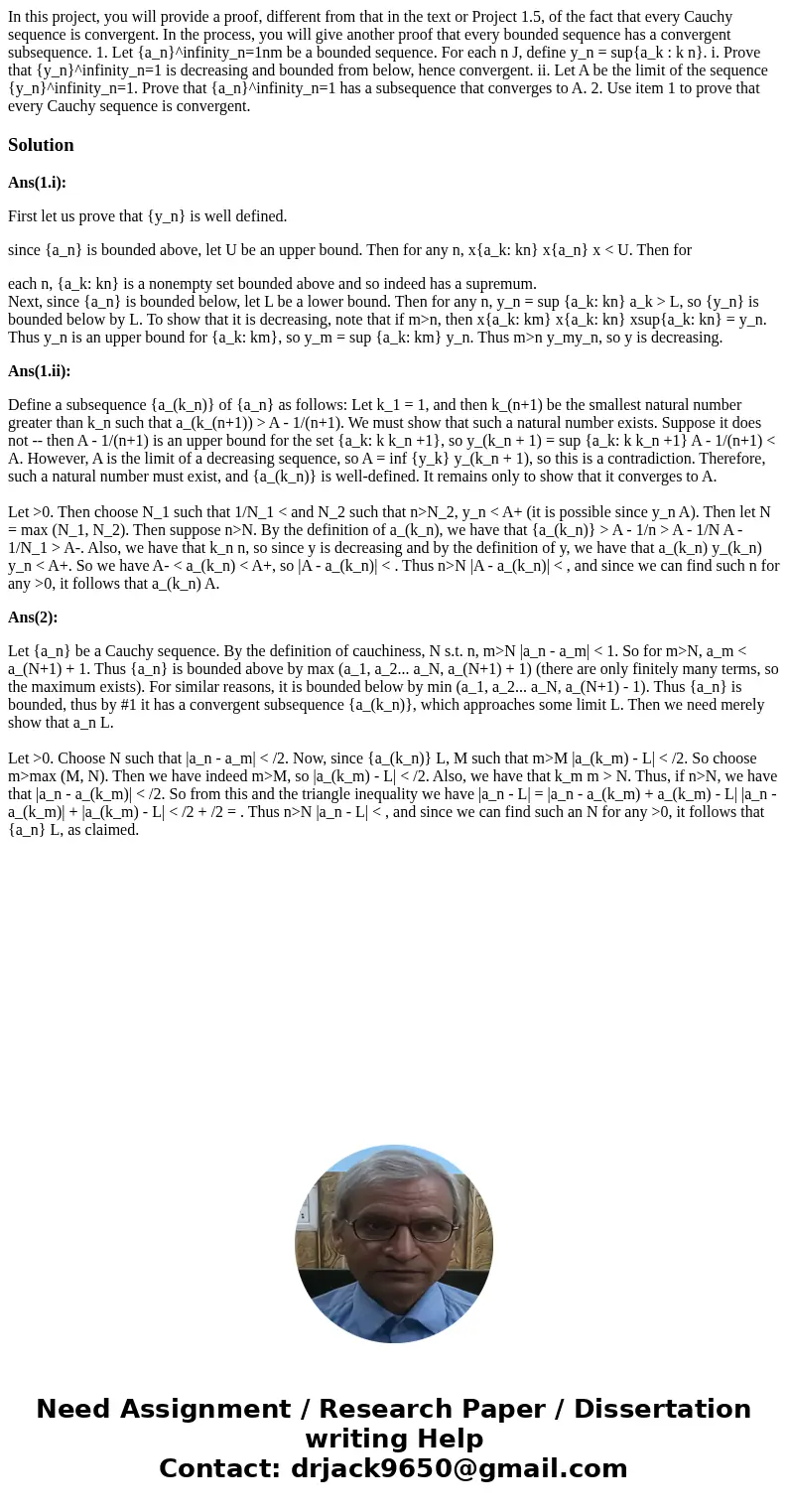In this project you will provide a proof different from that
Solution
Ans(1.i):
First let us prove that {y_n} is well defined.
since {a_n} is bounded above, let U be an upper bound. Then for any n, x{a_k: kn} x{a_n} x < U. Then for
each n, {a_k: kn} is a nonempty set bounded above and so indeed has a supremum.
Next, since {a_n} is bounded below, let L be a lower bound. Then for any n, y_n = sup {a_k: kn} a_k > L, so {y_n} is bounded below by L. To show that it is decreasing, note that if m>n, then x{a_k: km} x{a_k: kn} xsup{a_k: kn} = y_n. Thus y_n is an upper bound for {a_k: km}, so y_m = sup {a_k: km} y_n. Thus m>n y_my_n, so y is decreasing.
Ans(1.ii):
Define a subsequence {a_(k_n)} of {a_n} as follows: Let k_1 = 1, and then k_(n+1) be the smallest natural number greater than k_n such that a_(k_(n+1)) > A - 1/(n+1). We must show that such a natural number exists. Suppose it does not -- then A - 1/(n+1) is an upper bound for the set {a_k: k k_n +1}, so y_(k_n + 1) = sup {a_k: k k_n +1} A - 1/(n+1) < A. However, A is the limit of a decreasing sequence, so A = inf {y_k} y_(k_n + 1), so this is a contradiction. Therefore, such a natural number must exist, and {a_(k_n)} is well-defined. It remains only to show that it converges to A.
Let >0. Then choose N_1 such that 1/N_1 < and N_2 such that n>N_2, y_n < A+ (it is possible since y_n A). Then let N = max (N_1, N_2). Then suppose n>N. By the definition of a_(k_n), we have that {a_(k_n)} > A - 1/n > A - 1/N A - 1/N_1 > A-. Also, we have that k_n n, so since y is decreasing and by the definition of y, we have that a_(k_n) y_(k_n) y_n < A+. So we have A- < a_(k_n) < A+, so |A - a_(k_n)| < . Thus n>N |A - a_(k_n)| < , and since we can find such n for any >0, it follows that a_(k_n) A.
Ans(2):
Let {a_n} be a Cauchy sequence. By the definition of cauchiness, N s.t. n, m>N |a_n - a_m| < 1. So for m>N, a_m < a_(N+1) + 1. Thus {a_n} is bounded above by max (a_1, a_2... a_N, a_(N+1) + 1) (there are only finitely many terms, so the maximum exists). For similar reasons, it is bounded below by min (a_1, a_2... a_N, a_(N+1) - 1). Thus {a_n} is bounded, thus by #1 it has a convergent subsequence {a_(k_n)}, which approaches some limit L. Then we need merely show that a_n L.
Let >0. Choose N such that |a_n - a_m| < /2. Now, since {a_(k_n)} L, M such that m>M |a_(k_m) - L| < /2. So choose m>max (M, N). Then we have indeed m>M, so |a_(k_m) - L| < /2. Also, we have that k_m m > N. Thus, if n>N, we have that |a_n - a_(k_m)| < /2. So from this and the triangle inequality we have |a_n - L| = |a_n - a_(k_m) + a_(k_m) - L| |a_n - a_(k_m)| + |a_(k_m) - L| < /2 + /2 = . Thus n>N |a_n - L| < , and since we can find such an N for any >0, it follows that {a_n} L, as claimed.

 Homework Sourse
Homework Sourse